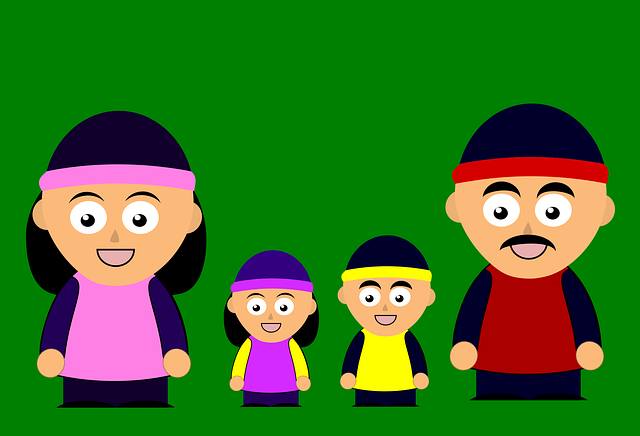Child custody and parental rights are vital aspects of family law cases concerning minors. The goal is to establish a custody arrangement prioritizing the child's safety, emotional well-being, and stability. This can result in joint or sole custody, with detailed agreements outlining care, support, decision-making, and visitation rights. Mediation is preferred over litigation for amicable resolutions, while a qualified custody lawyer helps parents navigate this complex process, advocating for their rights and the child's best interests. Such lawyers guide clients through mediation, disputes, and court battles, crafting parenting plans and ensuring stability in custody arrangements. Key terms include joint/sole custody, visitation rights, custody agreements, parental rights, mediation, and custody battle.
Navigating complex family law can be a daunting task, especially when it comes to matters of child custody and visitation rights. Understanding your parental rights and making informed decisions about custody arrangements is crucial for every parent’s well-being and their child’s future.
This comprehensive guide explores various aspects of custody and visitation legal services, offering insights into: custody agreements, mediation, dispute resolution, joint vs. sole custody, and more. Discover how a specialized custody lawyer can assist in crafting parenting plans, ensuring the best outcome for you and your family.
- Understanding Child Custody and Parental Rights
- Navigating Custody Agreements and Arrangements
- The Role of a Custody Lawyer in Mediation and Disputes
- Joint Custody vs. Sole Custody: Making the Right Choice for Your Family
Understanding Child Custody and Parental Rights

Child custody and parental rights are fundamental aspects of any family law case, especially when children are involved. These legal matters can be complex, often leading to intense debates between parents during a custody battle. The primary goal is to establish a custody arrangement that prioritizes the child’s best interests, ensuring their safety, emotional well-being, and stability. This may result in either joint custody, where both parents share responsibilities, or sole custody, where one parent has full legal guardianship.
Custody agreements and parenting plans are crucial documents that outline the specific terms of care and visitation rights. These plans can include details about child support, decision-making processes, and regular or restricted visitation schedules. In cases of dispute, custody mediation is a preferred method to reach an agreement amicably. A qualified custody lawyer or child custody attorney can guide parents through this process, ensuring their rights are protected and advocating for the best outcome for the family.
Navigating Custody Agreements and Arrangements

Navigating custody agreements and arrangements can be a complex and emotional process, especially during a custody battle. A qualified custody lawyer can help parents understand their parental rights and guide them through the creation or modification of a parenting plan. These plans detail how time with children will be divided between both parents, encompassing aspects like visitation rights, joint custody, and sole custody arrangements.
Custody mediation is another valuable tool in resolving custody disputes. It involves an impartial third-party who assists the parents in reaching a mutually agreeable custody arrangement. This approach can often avoid the prolonged stress and expense of court battles, ensuring that both parents’ concerns are heard while prioritizing the best interests of the child.
The Role of a Custody Lawyer in Mediation and Disputes

In the intricate world of family law, a custody lawyer plays a pivotal role in guiding parents through mediation and disputes related to child custody and visitation rights. These legal professionals are equipped with the knowledge and expertise to navigate complex issues surrounding parental rights and children’s best interests. When a friendly resolution is sought, they facilitate discussions between parents, helping them reach mutually agreeable custody agreements and visitation arrangements. This approach promotes a less contentious environment, allowing families to establish joint custody or work towards sole custody while prioritizing the child’s well-being.
In cases where agreement cannot be reached, a custody lawyer becomes an advocate for their client during a custody battle. They present evidence, argue legal points, and fight for their client’s desired custody arrangement, whether it involves shared parenting plans or sole guardianship. During this process, they collaborate with child specialists and other experts to craft a comprehensive parenting plan that ensures stability and continuity in the child’s life. Ultimately, their goal is to secure a favorable outcome while upholding the rights of both parents and prioritizing the best interests of the child.
Joint Custody vs. Sole Custody: Making the Right Choice for Your Family

When it comes to making decisions regarding child custody and visitation, understanding the distinctions between joint custody and sole custody is paramount. Both options have their merits and demerits, and the best choice largely depends on the specific dynamics of a family. Joint custody signifies a collaborative approach where both parents share legal decision-making authority and physical care responsibilities for their child or children. This arrangement fosters stability as it allows kids to maintain strong relationships with both mom and dad. It also promotes equality between parents, ensuring each has an active role in the child’s life.
On the other hand, sole custody grants one parent exclusive legal and physical custody of the child(ren). This scenario might be ideal when there are significant concerns about a parent’s ability to care for the child, such as substance abuse issues or domestic violence. However, it can lead to feelings of isolation and reduced time with the non-custodial parent if not carefully negotiated through custody agreements, parental rights, or custody mediation. A qualified custody lawyer specializing in family law can help navigate these complexities and work towards creating a parenting plan that best serves the needs and interests of all involved, minimizing the impact on the children during what could be a stressful custody dispute.
Navigating the complexities of child custody and visitation can be a challenging journey. Understanding your parental rights, crafting fair custody agreements, and resolving disputes through mediation or legal representation are vital steps in ensuring your children’s well-being. Whether considering joint custody, sole custody, or alternative arrangements, consulting a qualified custody lawyer can help you make informed decisions. By involving a child custody attorney, you can protect your rights, advocate for your family, and create a parenting plan that aligns with your unique circumstances, ultimately fostering a stable and loving environment for your children.
